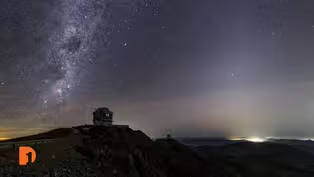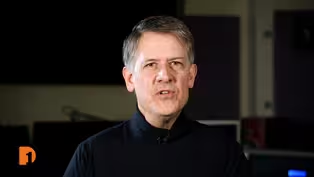
Detroit’s Godmother of House music: Stacey ‘Hotwaxx’ Hale
Clip: Season 7 Episode 43 | 6m 54sVideo has Closed Captions
One Detroit contributor Cecelia Sharpe of 90.9 WRCJ talks with Stacey “Hotwaxx” Hale.
In recognition of Women’s History Month, One Detroit contributor Cecellia Sharpe of 90.9 WRCJ talks with a pioneering African American woman in music, Stacey “Hotwaxx” Hale, the Godmother of House music. They talk about how Hale developed her unique multi-genre style, her passion for music education and mentorship, and about her Sheometry Music & Arts Festival.
Problems playing video? | Closed Captioning Feedback
Problems playing video? | Closed Captioning Feedback
One Detroit is a local public television program presented by Detroit PBS

Detroit’s Godmother of House music: Stacey ‘Hotwaxx’ Hale
Clip: Season 7 Episode 43 | 6m 54sVideo has Closed Captions
In recognition of Women’s History Month, One Detroit contributor Cecellia Sharpe of 90.9 WRCJ talks with a pioneering African American woman in music, Stacey “Hotwaxx” Hale, the Godmother of House music. They talk about how Hale developed her unique multi-genre style, her passion for music education and mentorship, and about her Sheometry Music & Arts Festival.
Problems playing video? | Closed Captioning Feedback
How to Watch One Detroit
One Detroit is available to stream on pbs.org and the free PBS App, available on iPhone, Apple TV, Android TV, Android smartphones, Amazon Fire TV, Amazon Fire Tablet, Roku, Samsung Smart TV, and Vizio.
Providing Support for PBS.org
Learn Moreabout PBS online sponsorship(upbeat prelude) (upbeat music) - Hi, I am Cecilia Sharp and we are celebrating Women's History Month and highlighting women in music.
Today my guest is Stacy "Hotwaxx" Hale the first DJ in Detroit to play House Music on the radio in the early eighties and the Godmother of House.
Thanks for being on the show.
- Thanks for having me.
- Absolutely.
You started during a time when it wasn't quite necessarily popular for women to DJ.
What attracted you to DJing?
- Well, I don't think it was not popular for women to be DJs but you recognize them on the radio as air personalities versus playing in the club.
And that's what was unusual for women to be doing that.
I was determined and male/female thing wasn't even in my thought process.
It was the love of the music and to be able to play it and present it to people.
My brother was big into electronics so I was always looking at reel to reels and cassette players and turntables and things like that.
So he was just one that liked to play music and hear it you know, he never inspired to be a DJ or anything so I kind of got that from him and I took it to another level and I stumbled in a old club it used to be a coffee shop, it was called the Chess Mate.
It's a laundromat now on McNichols and Livernoise.
And inside of there this organization called True Disco which consists of Ken Collier, Duane Bradley, Renaldo Smith and Morris Mitchell.
They created this thing called True Disco and they were in there playing.
I heard the records mixing and I went, "What?"
I found my way up to that booth and looked and I saw two turntables and the mixer and I said, "Oh that's what I need to be doing."
- You also performed at the Apollo Theater in Harlem.
- [Stacy] The Apollo Theater.
- [Cecelia] Yes, the Apollo Theater.
What brought you to the Apollo?
- Jessica Care Moore, Black Women Rock were now called the Daughters of Betty.
Yes, that's what brought me there.
And I work as the assistant music director helping Kat Dyson.
And in addition to me doing that being able to play with the band the Apollo actually called and asked me what I DJ.
They didn't have to ask me twice.
- [Cecelia] Of course they didn't.
They barely got it out their mouth before you said yes, right?
- [Stacy] I'm like.. once all my friends came that were in New York and they were dancing in the aisles up out the seats.
- The way that you engage your audience, you make everyone feel invited.
It's a warm environment.
Everyone knows that they can get down to the music.
The way you blend House Music with other genres, from gospel to R&B, a little bit of classical, jazz.
You incorporate acoustic live instruments.
It's just amazing.
How did you develop that style?
- Listen, you know, and that's the first thing I tell my students to do is to listen.
Use your ears.
And if you just pay attention to some things around you then allow the creativity inside of you to go on and incorporate it in something that you enjoy doing.
- You talked about students, Stacy and you're definitely passionate about not just performing and sharing your gifts with the audience and the people that love your music but passing on your knowledge, your wisdom to other young people, to students.
Why is it so important to you as a DJ, as an artist, to pass on that craft?
- It's so important for it to come from someone like me to be able to pass it on because I can tell you real stories.
I can let you know by different things, by real feelings.
You don't have to go to YouTube University to find out.
The best that I could do is to pass this on 'cause I want someone else to be able to do it.
And we'd like to have this not only be historic but for someone 50 years from now to be able to do that or at least take the theory of that and present themselves in that way.
- The Sheometry Music and Arts Festival that you created and launched in 2019, what is the mission of the Sheometry Music and Arts Festival?
- The mission is to be able to show off women that are good in music in many different genres.
A live instrument DJing, and in the business of music itself.
And it's primarily women with a splash of men to be able to show off the arts and things that they do within this big world of music.
- Because a lot of times it's the reverse of a lot of men in the festival with a clash of women.
But this time, this festival highlights women in music.
You have style on the turntables, but you also have your own fashionable style.
When you're rocking out, you always just bring it with the clothes, with the jewelry, with the hair.
Even today you've got your, you're representing the D with your old English D earrings on, you got these wonderful bengals and this piece that you are wearing as a necklace.
Tell us about that piece.
- This right here is a 45 spindle and it spins and I realize there's three generations that don't even know what this is.
And this used to be the item that you would place inside of the 45 record that you put on the turntable in order to play records.
And so I love to, you know show this and I wear it all the time.
This is actually a key chain.
- Stacy, what makes your music so unique?
- My music is so unique is because I believe in making people happy.
When I play music, it's my job to make you happy.
So therefore I place myself in environments where people are gonna enjoy the types of sound I deliver.
I'm very spiritual.
I love gospel House Music.
Many of the selections that I play have that type of thing in it.
And I have been successful in those that say, "I don't like House Music, but I like yours."
And that's because it's coming from the heart and the vibe like that and they make you feel good.
And that's my whole point and everything and it's been proven.
Enjoy.
(echoing in the mic) (upbeat music)
Great Lakes Now | Fading stars and river bugs episode promo
Video has Closed Captions
Clip: S7 Ep43 | 53s | A citizen science project in Ypsilanti, Michigan researches the health of the Rouge River. (53s)
One Detroit Weekend: March 24, 2023
Video has Closed Captions
Clip: S7 Ep43 | 1m 54s | Peter Whorf of 90.9 WRCJ shares what’s happening around Detroit on “One Detroit Weekend.” (1m 54s)
Providing Support for PBS.org
Learn Moreabout PBS online sponsorship
- News and Public Affairs

Top journalists deliver compelling original analysis of the hour's headlines.

- News and Public Affairs

FRONTLINE is investigative journalism that questions, explains and changes our world.












Support for PBS provided by:
One Detroit is a local public television program presented by Detroit PBS

